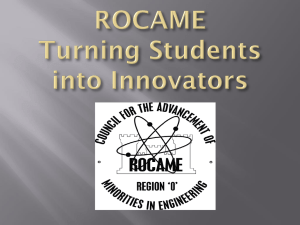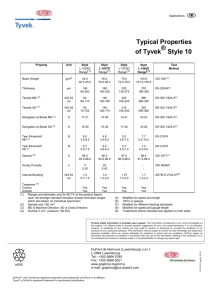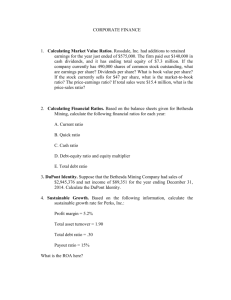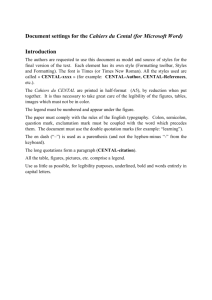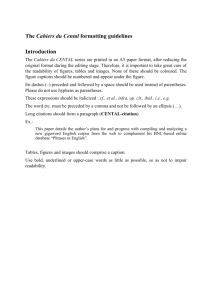chapter 3 PowerPoint
advertisement
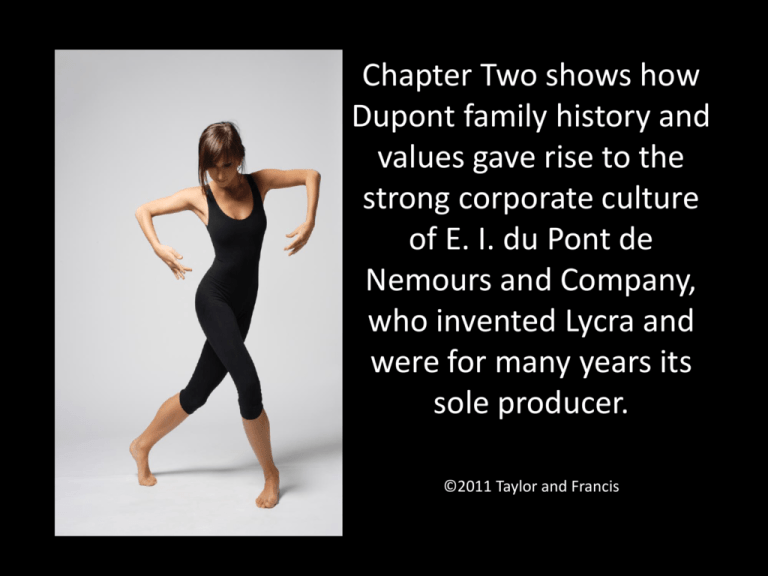
Chapter Two shows how Dupont family history and values gave rise to the strong corporate culture of E. I. du Pont de Nemours and Company, who invented Lycra and were for many years its sole producer. ©2011 Taylor and Francis What is ‘corporate culture’ and what makes a ‘strong’ corporate culture? • ‘Corporate culture’ refers to a company’s unique values, methods and worldview– ‘the way things are done around here’. • In a pioneering study carried out in the 1980’s, sociologists Deal and Kennedy used anthropology to explain what made some companies and products successful, while others failed. ©2011 Taylor and Francis • Deal and Kennedy concluded that successful companies were distinguished by a strong corporate culture consisting of values, myths, heroes and symbols that mean a great deal to the people that work there, influencing the things they produce and how they produce them. • Recommended reading: Deal, Terrence and Kennedy, Allen, 1982. Corporate Cultures: The Rites and Rituals of Corporate Life. London, Penguin Books. © 2010 Taylor and Francis E. I. du Pont de Nemours and Co. E. I du Pont de Nemours and Company – popularly known as ‘Dupont’ and headquartered in Wilmington, Delaware – was identified by Deal and Kennedy as having one of the strongest corporate cultures. Founded in 1802 and one of the oldest firms in the Fortune 500 group of the largest companies in the United States, it is a global corporation, operating in some 80 countries worldwide, employing some 58,000 people and generating revues in 2009 of S26.1 billion. How did the company get to be the way it is today? For a description of the present corporation, see the Dupont website: http://www2.dupont.com/Our_Company/en_US/ ©2011 Taylor and Francis ORIGIN MYTHS: THE STORIES COMPANIES TELL ABOUT THEMSELVES ‘Origin myths’ or ‘origin stories’ are a term anthropologists use for the stories families and companies tell about their beginnings, to remind themselves and explain to others why and how their distinctive values and practices came about. Origin myths are an important key to understanding why people do what they do, and they are an important tool for any kind of analysis ©2011 Taylor and Francis The Dupont Heritage Dupont has a ‘heritage’ section on its corporate website: • http://www2.dupont.com/Heritage/en_US/1802_DuP ont/IN_Depth_1802.html In the heritage section of the website you see the ‘official version’ of the Dupont origin myth in which the early family and company are shown as inseparable. These close links between family and company was one of the sources of Dupont’s strong corporate culture. ©2011 Taylor and Francis ‘Owning’ Science Another source of corporate strength was Dupont’s ‘ownership’ of chemistry, the cutting edge science of the eighteenth and nineteenth centuries. See http://www.chemheritage.org/ ©2011 Taylor and Francis The company’s immigrant founder, E. I. du Pont de Nemours, had been trained in France by Antoine Lavoisier, the father of French chemistry, whose methods, transplanted to America, became the basis of Dupont company practice. The confidence that came with having this ‘chemical birthright’ and the value placed on scientific research and development in the tradition of Lavoisier was another element of Dupont’s strong corporate culture and commercial success. © 2011 Taylor and Francis Official and unofficial accounts • The Dupont heritage site, like all official accounts, only tells part of the story about how a family, group or corporation work, and how they got to be the way they are. • For a full account, you have to supplement the official version with ethnography and archival work from a variety of sources. • Always ask yourself why the official account of anything says what it does., and why it leaves some things out. What isn’t said is just as important as what is, often more. © 2011 Taylor and Francis Why do corporate history and origin myths matter? • History and origin myths matter because they influence what a company makes and does, and, through that, affect our daily life. As the anthropologist Dan Rose put it – ‘the corporate form encases us in our everyday life.’ • Recommended reading on different kinds of company and family origin myths: Yanagisako, Sylvia Junko, 2002: Producing Culture and Capital: Family Firms in Italy. Princeton and Oxford, Princeton University Press. © 2011 Taylor and Francis Another corporate heritage site • For example, the industrialist Henry Ford (1863-1947) revolutionised the American way of life through the mass-production of inexpensive cars: the company likes to say that Ford ‘put the world on wheels’, and Henry Ford’s development of the factory assembly line made it possible to produce inexpensive goods for working people on an unprecedented scale. • Like Dupont, the Ford Motor Company began as a family company, and they have a heritage section on their corporate website, which gives the Ford origin myth and provides insights into the way single powerful individuals and corporations can transform daily life: http://www.ford.com/about-ford/heritage © 2011 Taylor and Francis Dupont’s diversified products • Dupont’s strong corporate culture, scientific expertise and distinctive working practices enabled the corporation to diversify and produce a wide range of materials. • Unlike Ford, which produced one product which it sold direct to the public, Dupont’s materials – such as plastics and film – were used in mass-market products made by other producers that became a fundamental part of American life – as the company put it on their website, “Look closely at the things around your home and workplace, and chances are, you’ll find dozens of items made with DuPont materials’. © 2011 Taylor and Francis The big question • Because of the effect large corporations can have on the way we live, some anthropologists and other social scientists say that corporations are ‘hegemonic’ and ‘manipulative’ – meaning that they control us. • But can corporations really make us do what they like, or are other forces at work that can affect what corporations do – such as historical events, social change and public culture? • By studying stuff, we can see that things are much more complex than the simple opposition of manipulators/manipulated. ©2011 Taylor and Francis Discussion questions – Chapter Two 1. Compare the official version of Dupont’s company and family history on the website with the version in the book. What are the similarities and differences? 2. Compare the Dupont heritage website with the Ford heritage website: what are the similarities and differences 3. What contemporary corporations have distinctive products, well-known founders and strong values. How would you present the ‘origin myth’ of one of these strong culture companies (for example, Apple). © 2011 Taylor and Francis 4) E.I. du Pont and Henry Ford were both charismatic figures in their lifetimes, as were Estee Lauder, Elizabeth Arden and Helena Rubinstein in the cosmetic companies that still carry their names. How important do you think individual vision and entrepreneurship are in making stuff that changes the way we live? • Recommended reading: Koehn, Nancy ‘Estee Lauder: Self Definition and the Modern Cosmetics Market’ in Philip Scranton (ed) 2001,Beauty and Business: Commerce, Gender and Culture in Modern America .New York and London, Routledge, pp 217-251) © 2011 Taylor and Francis 4) Companies and businesses don’t have to be big to have strong cultures. Do you know of a small organization with a strong culture? Describe its distinctive practices and origin myths. 5) ‘The corporate form encases us all’ (Dan Rose). Discuss. 6) “Look closely at the things around your home and workplace, and chances are, you'll find dozens of items made with DuPont materials’. How many things in your home or workplace are made by particular companies? © 2011 Taylor and Francis


